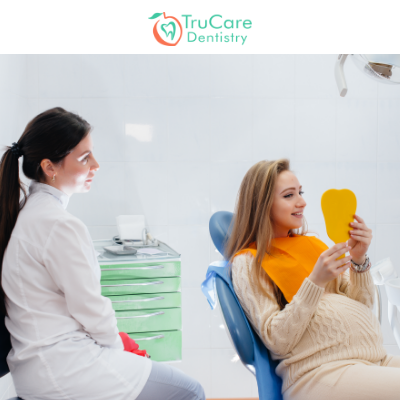
Oral health is a crucial part of prenatal care. Taking good oral hygiene can ensure a healthy pregnancy and a healthy baby. Pregnancy can make women more prone to gum diseases and other dental health issues.
Various factors add up to cause dental health issues during pregnancy. The increased progesterone and estrogen levels are among the most significant changes that make you more prone to these issues. Tender gums and nausea during pregnancy may also cause you to brush or floss less efficiently, compromising your dental hygiene. Your changing eating habits may also add up to causing some issues for your oral health.
Here are some of the complications your oral health could face during pregnancy:
Periodontal Disease
Your changing hormones can trigger your gums to be swollen and inflamed. This condition is called gingivitis, an early stage of periodontal disease that 60-75% of women suffer from during pregnancy. When left untreated, gingivitis can lead to periodontal disease, which can infect your gums and cause you to lose the bone that supports your teeth. Periodontal disease can even lead to severe issues that require immediate medical attention, like bacteremia, where bacteria enter your bloodstream.
Cavities
Cavities are permanently damaged areas on the surface of your teeth that can develop into holes. Being pregnant makes you more susceptible to cavities due to changing oral health behaviors and eating habits. Also, cavities are dental health issues you can pass on to your child. Babies with mothers with high levels of untreated cavities are three times more likely to have cavities. Early contact with these bacteria and other sugars can lead to cavities in children.
Loose Teeth
The increased progesterone and estrogen levels in pregnant women can cause the tissues and bones that support teeth to loosen slightly.
Pregnancy Tumors
Pregnancy tumors (also known as pyogenic granuloma) are lumps that can form on the gums, usually near the upper gum line. These lumps with deep red pinpoint marks can bleed and even cause discomfort while eating and speaking. But don’t worry; these tumors are not cancerous. They react to inflammation in up to 10% of pregnant women. These tumors usually occur in the second trimester and go away on their own after giving birth. If they don’t, they may have to be removed under anesthesia by a professional. It is advised to have them removed only after giving birth because they may redevelop in about half the cases if removed during pregnancy.
You May Also Like to Read, Why Expecting Mothers Need to Take Special Oral Care
Signs of Oral Health Problems During Pregnancy
Like other health problems, it also helps to detect these oral health problems early.
You must pay regular attention to your oral health during pregnancy and watch out for troubling signs and symptoms like:
- Mouth sores
- Tumors
- Loose teeth
- Receding gums
- Bleeding gums
- Red and swollen gums
- Toothache
- Bad breath
- Tooth Sensitivity
- Spontaneous pain
- Holes or pits in your teeth
If you notice any of these signs, you must visit your dentist. And if you notice sudden pain or swelling, you must contact your dentist immediately.
Oral Care During Pregnancy
Since you’re more prone to dental issues during pregnancy, good oral hygiene becomes even more critical.
So let’s discuss how to avoid these issues while pregnant. Below are some of the basic dental hygiene practices you should be aware of while you’re pregnant:
- Brush your teeth twice a day.
- Use fluoridated toothpaste.
- Floss every day.
- Limit consumption of sweet foods.
- Rinse your mouth with water or an antimicrobial if you suffer from frequent vomiting.
- Eat a healthy diet.
- Visit your dentist regularly.
Dental checkups are an essential part of maintaining your overall health during pregnancy. You must visit your dentist every 3-6 months while pregnant or trying to conceive. Regular cleanings are also a great way to protect yourself further from various oral health problems.
Oral health during pregnancy becomes even more critical to prevent passing on any aggressive bacteria or other dental issues to newborns that they can carry further into their childhoods. You do not have to worry about dental x-rays that your dentist sometimes requires for an assessment. They’re done with extreme caution to protect your baby and body parts like the abdomen, thyroid, etc. The local anesthesia and other medications you may be given in case of any problem with your oral health would also be pregnancy safe.
If you’re pregnant and looking to ensure your pristine oral health or treat delicate dental problems by the best dentist in Roswell, GA, or neighboring areas such as Alpharetta, Dunwoody, Marietta, Milton, Sandy Springs, or Woodstock, book an appointment at TruCare Dentistry. To know more about our services, visit our website or call (678) 321-7575.
